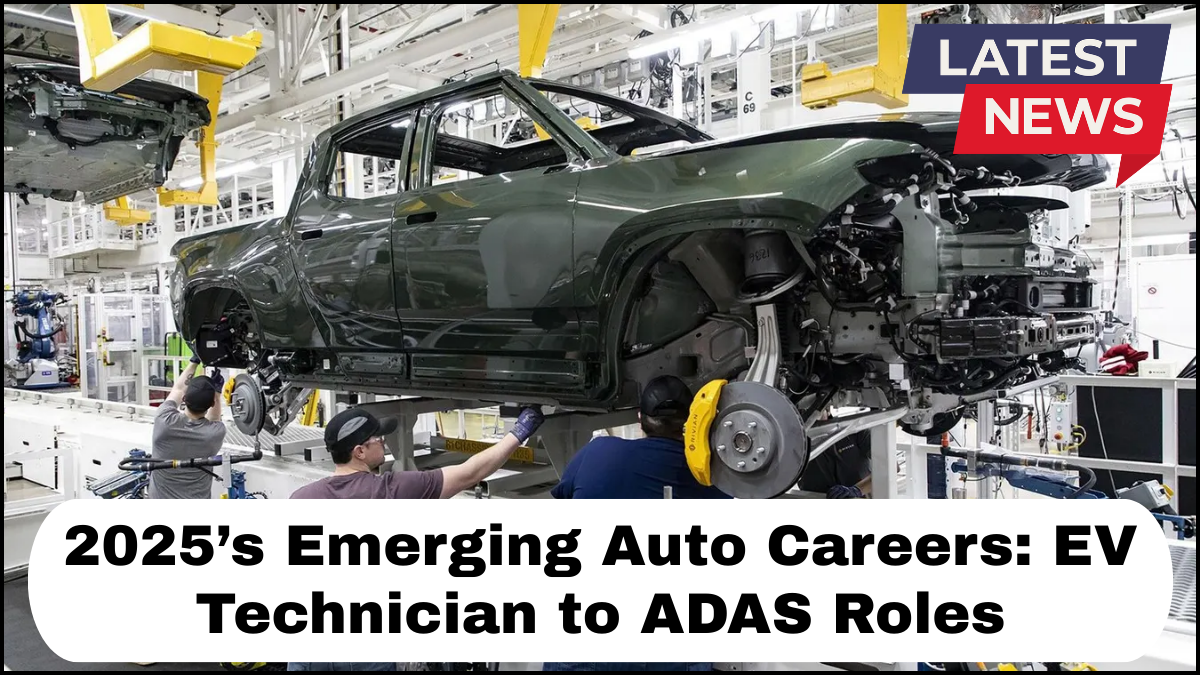As the auto industry undergoes a major transformation driven by electrification and automation, a new wave of EV career options is reshaping the job landscape. The shift away from traditional internal combustion engines toward electric and autonomous vehicles is creating high-demand roles that didn’t exist a decade ago. In 2025, anyone considering a career in the automotive field should be looking beyond the wrench-and-grease stereotype and toward the cutting edge of mobility tech.

Here’s a breakdown of the top emerging careers in the auto sector, with a spotlight on opportunities like EV technician roles and specialists in ADAS (Advanced Driver Assistance Systems).
The Rise of EV Technician Roles
Electric vehicles (EVs) aren’t just trending—they’re fast becoming the industry standard. With governments enforcing stricter emissions laws and automakers shifting production lines toward electric models, the demand for EV technicians is surging.
EV technicians differ from traditional auto mechanics in both skills and tools. They work with high-voltage battery systems, electric drivetrains, regenerative braking systems, and complex onboard electronics. Because EVs require far less mechanical maintenance but more electronic diagnostics and firmware updates, this role blends IT knowledge with electrical engineering and automotive fundamentals.
Key skills needed:
-
Understanding of lithium-ion battery systems
-
High-voltage safety certification
-
Diagnostic software proficiency
-
Familiarity with EV-specific components (e.g., inverters, controllers)
Example:
Tesla, Rivian, and legacy automakers like Ford and GM are expanding their EV technician training programs to keep up with service demands. Independent shops and dealerships also need certified EV specialists to meet the growing number of electric vehicles on the road.
ADAS Specialist: Driving the Future of Vehicle Safety
ADAS stands for Advanced Driver Assistance Systems, and it includes technologies like lane-keeping assist, adaptive cruise control, collision avoidance, and automated parking. As vehicles grow smarter, the integration and calibration of these systems become essential.
An ADAS specialist works at the intersection of automotive electronics, software calibration, and sensor alignment. Their role is critical to ensure that radars, cameras, and LIDAR systems function properly to keep drivers safe.
Core responsibilities include:
-
Calibrating sensor systems after repairs or replacements
-
Troubleshooting software updates or sensor malfunctions
-
Interpreting diagnostic codes and performance data
-
Ensuring compliance with safety standards
Example:
Body shops that handle collision repair increasingly need ADAS experts to recalibrate systems post-repair. A misaligned camera can compromise safety, making the role of the ADAS technician vital for vehicle reliability and driver trust.
Other Emerging Roles in the EV and ADAS Ecosystem
As the industry evolves, so do the job functions around it. Here are a few more EV career options worth exploring:
1. Battery Systems Engineer
Focuses on the design, testing, and optimization of EV battery packs. This role requires chemistry, thermodynamics, and software integration skills.
2. Charging Infrastructure Technician
Responsible for installing and maintaining EV charging stations—both public and private. With rapid charging networks expanding, this job is becoming increasingly critical.
3. Vehicle Software Developer
With vehicles now housing millions of lines of code, software development is central. These professionals create user interfaces, control systems, and connectivity features.
4. Telematics Specialist
Works with systems that transmit real-time vehicle data to users or fleet managers. This is crucial for remote diagnostics, predictive maintenance, and smart fleet operations.
Skills That Give You an Edge in the New Auto Sector
Success in these auto sector jobs demands more than traditional mechanic training. Key skill sets include:
-
Programming and software literacy
-
Understanding of CAN bus systems and diagnostic protocols
-
Electrical and electronics knowledge
-
Continuous learning mindset (due to fast-evolving tech)
Certifications like ASE’s Light Duty Hybrid/Electric Vehicle Specialist and OEM-specific training (e.g., from Tesla START or Toyota T-TEN) can significantly boost employability.
FAQs
Q1: Is it necessary to go back to school to start a career as an EV technician?
Not always. Many community colleges and technical schools offer fast-track certification programs focused on EV systems. Some employers also provide on-the-job training.
Q2: What is the average salary for an EV technician?
Salaries vary by location and experience, but entry-level EV technicians typically earn between $50,000 to $65,000 annually, with room to grow as demand rises.
Q3: How does ADAS work with self-driving technology?
ADAS is a foundational layer of self-driving systems. While not fully autonomous, it introduces automated driving features that help drivers stay safe and reduce accidents.
Q4: Are these roles in demand globally or only in specific regions?
Globally. As EV adoption increases worldwide, so does the need for skilled labor. Countries like the U.S., Germany, China, and India are seeing a rise in EV-related job postings.
Q5: Can someone from a traditional auto mechanic background transition into these new roles?
Absolutely. Many core skills are transferable. With additional training in electronics, software, and diagnostics, traditional mechanics can successfully pivot to EV or ADAS roles.
click here to learn more